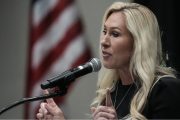The recent 241-83 vote by the South African Parliament to simply take land away from white farmers because they are white, without compensation, has awakened many citizens in other countries to the potential genocide facing the white population of South Africa. Petition efforts have begun in Europe and the United States to allow the country’s four and a half million white citizens to seek humanitarian asylum.
Not surprisingly, the response of the increasingly totalitarian South African government to such efforts is to charge “racism.” Apparently, remarks by Marxist Julius Malema of the Economic Freedom Fighters (EFF) party, who has called white South Africans “criminals,” who “stole” the land, and has said that he is “not calling for the slaughter of white people — at least for now,” is not racist?
Actually, the commentary goes beyond anything Nazi dictator Adolf Hitler said publicly about the Jews — before he launched his “Final Solution” program, which became “the Holocaust.”
Thus far, more than 12,000 people have signed the U.S. petition, asking President Trump to allow South African whites to emigrate to America. Another petition, asking European Union President Jean-Claude Juncker, German Chancellor Angela Merkel, and British Prime Minister Theresa May to allow white South Africans into Europe, has already garnered almost 17,000 signatures.
The petition can be accessed online, and it asks Trump to “take the steps necessary to initiate an emergency immigration plan allowing white Boers to come to the United States.” A Boer is a descendant of the white European immigrants to South Africa, who were mostly from the Netherlands, Germany, or France. The immigrants were overwhelmingly Calvinistic, being members of “Reformed” churches such as the Dutch Reformed Church, or French Calvinists known as Huguenots.
The claim that these Boers, also often called Afrikaners, simply moved in and “stole” the land from native black farmers is historically inaccurate. When their ancestors moved to southern Africa 14 generations ago, no one lived on the land.
Yet South Africa’s new president, Cyril Ramaphosa, supports the confiscation of white-owned land, without compensation, repeating hot Marxist rhetoric that the whites own 73 percent of the land. When the white minority agreed to allow the black population to vote (and thus be able to dominate the government) back in the 1990s, promises were made that private property would be respected. Apparently, those promises meant nothing. In the present atmosphere of South Africa, the country’s first black president, Nelson Mandela, who was a secret member of the South African Communist Party, appears downright moderate.
The motion to break those promises and essentially steal white-owned land still needs the approval of the South African Parliament’s Constitutional Review Committee, so the Boers have some time to decide the best way to respond. Also, there are many black South Africans who are cautioning against the confiscation policy, pointing to the example of a similar expropriation policy in Zimbabwe by Marxist dictator Robert Mugabe, which left that country an economic shambles.
In 2014, Mugabe told the Christian Science Monitor, “We say no to whites owning our land, and they should go.” They can own companies and apartments, “but not the soil.” By that time, the majority of whites in Zimbabwe had already decided that exiting was the best policy, and had left.
While Mugabe claimed he was taking the land from white farmers for the benefit of the black population of Zimbabwe, the reality was that he and his cronies held personal control of about 40 percent of the land seized. Mugabe’s actions led to a 40-percent shrinkage of its economy and inflation rates that made its currency worthless (in 2008, Bloomberg reported that inflation was at 500 billion percent).
Finally, Mugabe was ousted, and the new rulers of Zimbabwe are making efforts to repair the damage done by his communistic economic policies. A land compensation committee has been established that would allow former commercial farmers whose land was seized nearly 20 years ago to seek compensation.
Despite the example of Zimbabwe, South Africa’s leftist politicians have decided to blame the country’s economic problems on the prosperous white farmers.
For the oppressed Boers, moving to another country is one potential option, if they can get in. Australian Home Affairs Minister Peter Dutton openly advocated in March that his country allow them to seek asylum in his country. “We want people who want to come here, abide by our laws, integrate into our society, work hard, not lead a life on welfare. And I think these people deserve special attention and we’re certainly applying that special attention now.”
But because there is some concern that European countries and the United States might not be willing to accept Boers, out of concern for domestic politics (e.g., there is little doubt that an announcement by President Trump that he was going to admit white South Africans would precipitate immediate claims of racism), some Boer political leaders have proposed secession as the solution.
Harry Booyens, an Afrikaner who wrote AmaBhulu: The Birth and Death of the Second America, lamented, “The world is witnessing the beginning of the end of South Africa as a viable country.” Writing in response to the move to confiscate white-owned land, he suggested “formal secession” as the best option available. “The world supported the split of the Sudan into two countries based on race; it is now inevitable in South Africa. The only question is how many will have to die before the inevitable happens.”
Booyens does not believe the United States and the countries In Europe “have the moral guts” to accept the nearly five million white South Africans as refugees. He told The New American, “The only possibility is secession.”
Hopefully, the end result will not be a Hitlerian-like genocide, while the Western world turns away Christian farmers.
Photo of South African farmer: Voice of America




